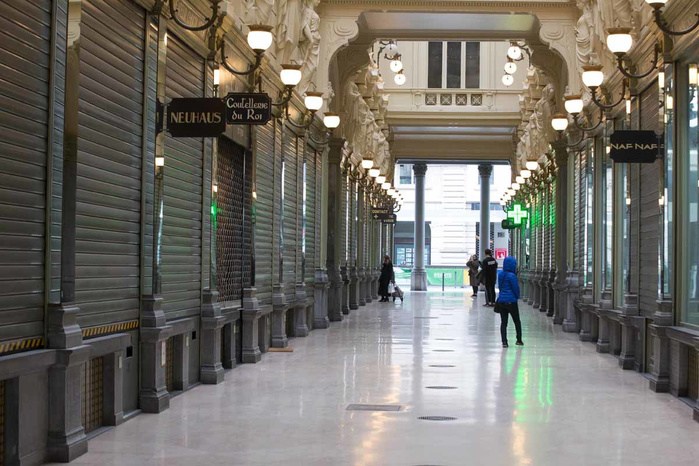On Wednesday, the Belgian government announced an Easter ‘pause’, which will go into effect from Saturday evening 27 March, and see new restrictions imposed across several sectors for at least four weeks.
From the Belgian hairdresser federation to Flemish Minister of Education Ben Weyts, here are some of the reactions to the news.
Non-essential shops
The news that Belgium's non-essential shops would be targeted by the measures was met with a sense of disappointment rather than relief, according to Lora Nivesse of the trade federation Comeos.
Across the country, non-essential shops will only be able to receive clients by appointment, with a maximum of 50 people allowed in the shop at once, depending on the store size.
"Shopping by appointment is better than nothing, but we are still very disappointed that our sector is once again affected while there are no security problems with us,” she told VRT News, adding that she doubts it will be profitable for shops to stay open in this way and that it will be almost impossible to set up this system by Saturday.
According to the Federation of Enterprises in Belgium (FEB) there is little proof the sector influenced infection rates: "After reopening of the non-essential shops in December, we saw no significant increases in the number of cases in the months that followed.”
Related News
- Belgium implements 'Easter pause' with strict new measures
- Hard, short lockdown also best option from psychological perspective, report finds
The criticism of the measures is not limited to the sector, with Carl Decaluwé, the Governor of West Flanders, expressing his worry about the effect this will have on the coast during the Easter holidays, as large groups of people may flock to the coast due to the non-essential travel ban.
"Now not only restaurants but also shops are closed. This again means fewer opportunities to spread out,” said Decaluwé.
Non-medical contact professions
This news also means businesses ranging from hairdressers to massage parlours and beauty salons, will have to close their doors again, less than two months after re-opening, leading to complaints of unfair treatment from the industry.
“This lockdown will make no difference for the virus, but it will make a difference for our income. With six months of closure in the last 12 months, we have more than done our bit," said the United Hairdressers and the Belgian Beauty Federation.
The Belgian Hairdressers' Federation too commented that it feels disappointed and even threatened, even though it saw the news coming. "We are still extremely disappointed, especially because there is no complete lockdown," chair Chris Maenhout told De Morgen.
Although Federal Health Minister Frank Vandenbroucke emphasised the government was not pointing the finger at one sector, Maenhout feels hairdressers are being particularly punished, as they have “been working by appointment for ages, and have followed strict measures."
Education
Flemish Minister of Education Ben Weyts personally responded with anger to the closing of schools, saying “Ikea opened and the school closed. That is not my vision of society."
From Monday, all classes in primary, secondary schools, and higher education will be suspended, until at least 19 April, when the government hopes to fully re-open them.
Weyts said he has worked with all partners in education to keep all schools open in the safest way possible, "but to my regret, the Flemish Government is the only one fighting to keep schools open.”
Meanwhile, the ambiguity of the measures has also been pulled into question by the top executive of Catholic Education, Lieven Boeve, who said it will be difficult to impose these changes with such short notice.
The government said that this short pain will be better in the long-run than the outcome of other difficult, but less strict decisions.
Lauren Walker
The Brussels Times

